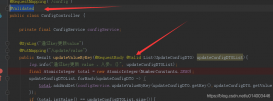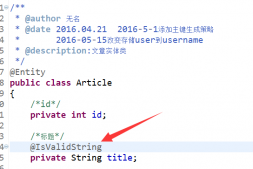EnumSet
EnumSet是Java枚举类型的泛型容器,Java既然有了SortedSet、TreeSet、HashSet等容器,为何还要多一个EnumSet<T>呢?答案肯定是EnumSet有一定的特性,举个例子,EnumSet的速度很快。其他特性就不一一列举了,毕竟本文的内容不是介绍EnumSet的特性。
专门为枚举类设计的集合类,所有元素必须是枚举类型
EnumSet的集合元素是有序的,内部以位向量的形成存储,因此占用内存小,效率高
不允许加入null元素
|
1
2
3
4
5
6
7
8
9
10
11
12
13
14
15
16
17
18
19
20
21
22
23
24
25
26
27
28
29
30
31
32
33
34
35
36
37
38
39
40
41
42
43
44
45
46
47
48
49
50
51
52
53
54
55
56
57
58
59
60
61
62
63
64
65
66
67
68
69
70
71
72
73
74
75
76
77
78
79
80
81
82
83
84
85
86
87
88
89
90
91
92
93
94
95
96
97
98
99
100
101
102
103
104
105
106
107
108
109
110
111
112
113
114
115
116
117
118
119
120
121
122
123
124
125
126
127
128
129
130
131
132
133
134
135
136
137
138
139
140
141
142
143
144
145
146
147
148
149
150
151
152
153
154
155
156
157
158
159
160
161
162
163
164
165
166
167
168
169
170
171
172
173
174
175
176
177
178
179
180
181
182
183
184
185
186
187
188
189
190
191
192
193
194
195
196
197
198
199
200
201
202
203
204
205
206
207
208
209
210
211
212
213
214
215
216
217
218
219
220
221
222
223
224
225
226
227
228
229
230
231
232
233
234
235
236
237
238
239
240
241
242
243
244
245
246
247
248
249
250
251
252
253
254
255
256
257
258
259
260
261
262
263
264
265
266
267
268
269
270
271
272
273
274
275
276
277
278
279
280
281
282
283
284
285
286
287
288
289
290
291
292
293
294
295
296
297
298
299
300
301
302
303
304
305
306
307
308
309
310
311
312
313
314
315
316
317
318
319
320
|
package java.util;import sun.misc.SharedSecrets;public abstract class EnumSet<E extends Enum<E>> extends AbstractSet<E> implements Cloneable, java.io.Serializable{ /** * 元素类型 */ final Class<E> elementType; /** * 通过数组存储元素 */ final Enum[] universe; private static Enum[] ZERO_LENGTH_ENUM_ARRAY = new Enum[0]; EnumSet(Class<E>elementType, Enum[] universe) { this.elementType = elementType; this.universe = universe; } /** * 创造一个空的 enum set 并制定其元素类型 * @param elementType the class object of the element type for this enum * set * @throws NullPointerException if <tt>elementType</tt> is null */ public static <E extends Enum<E>> EnumSet<E> noneOf(Class<E> elementType) { Enum[] universe = getUniverse(elementType); if (universe == null) throw new ClassCastException(elementType + " not an enum"); if (universe.length <= 64) return new RegularEnumSet<>(elementType, universe); else return new JumboEnumSet<>(elementType, universe); } /** * 创建一个包含所有在指定元素类型的元素的枚举set * * @param elementType the class object of the element type for this enum * set * @throws NullPointerException if <tt>elementType</tt> is null */ public static <E extends Enum<E>> EnumSet<E> allOf(Class<E> elementType) { EnumSet<E> result = noneOf(elementType); result.addAll(); return result; } /** * Adds all of the elements from the appropriate enum type to this enum * set, which is empty prior to the call. */ abstract void addAll(); /** * 创建一个枚举设置相同的元素类型与指定枚举set * * @param s the enum set from which to initialize this enum set * @throws NullPointerException if <tt>s</tt> is null */ public static <E extends Enum<E>> EnumSet<E> copyOf(EnumSet<E> s) { return s.clone(); } /** * 创建一个枚举集从指定集合初始化,最初包含相同的元素 * @param c the collection from which to initialize this enum set * @throws IllegalArgumentException if <tt>c</tt> is not an * <tt>EnumSet</tt> instance and contains no elements * @throws NullPointerException if <tt>c</tt> is null */ public static <E extends Enum<E>> EnumSet<E> copyOf(Collection<E> c) { if (c instanceof EnumSet) { return ((EnumSet<E>)c).clone(); } else { if (c.isEmpty()) throw new IllegalArgumentException("Collection is empty"); Iterator<E> i = c.iterator(); E first = i.next(); EnumSet<E> result = EnumSet.of(first); while (i.hasNext()) result.add(i.next()); return result; } } /** * 创建一个枚举集合,其元素与 s 相同 * @param s the enum set from whose complement to initialize this enum set * @throws NullPointerException if <tt>s</tt> is null */ public static <E extends Enum<E>> EnumSet<E> complementOf(EnumSet<E> s) { EnumSet<E> result = copyOf(s); result.complement(); return result; } /** * 1 个元素枚举集合 * * @param e the element that this set is to contain initially * @throws NullPointerException if <tt>e</tt> is null * @return an enum set initially containing the specified element */ public static <E extends Enum<E>> EnumSet<E> of(E e) { EnumSet<E> result = noneOf(e.getDeclaringClass()); result.add(e); return result; } /** * 2 个元素枚举集合 * * @param e1 an element that this set is to contain initially * @param e2 another element that this set is to contain initially * @throws NullPointerException if any parameters are null * @return an enum set initially containing the specified elements */ public static <E extends Enum<E>> EnumSet<E> of(E e1, E e2) { EnumSet<E> result = noneOf(e1.getDeclaringClass()); result.add(e1); result.add(e2); return result; } /** * 3 个元素枚举集合 * * @param e1 an element that this set is to contain initially * @param e2 another element that this set is to contain initially * @param e3 another element that this set is to contain initially * @throws NullPointerException if any parameters are null * @return an enum set initially containing the specified elements */ public static <E extends Enum<E>> EnumSet<E> of(E e1, E e2, E e3) { EnumSet<E> result = noneOf(e1.getDeclaringClass()); result.add(e1); result.add(e2); result.add(e3); return result; } /** * 4 个元素枚举集合 * @param e1 an element that this set is to contain initially * @param e2 another element that this set is to contain initially * @param e3 another element that this set is to contain initially * @param e4 another element that this set is to contain initially * @throws NullPointerException if any parameters are null * @return an enum set initially containing the specified elements */ public static <E extends Enum<E>> EnumSet<E> of(E e1, E e2, E e3, E e4) { EnumSet<E> result = noneOf(e1.getDeclaringClass()); result.add(e1); result.add(e2); result.add(e3); result.add(e4); return result; } /** * 5 个元素枚举集合 * * @param e1 an element that this set is to contain initially * @param e2 another element that this set is to contain initially * @param e3 another element that this set is to contain initially * @param e4 another element that this set is to contain initially * @param e5 another element that this set is to contain initially * @throws NullPointerException if any parameters are null * @return an enum set initially containing the specified elements */ public static <E extends Enum<E>> EnumSet<E> of(E e1, E e2, E e3, E e4, E e5) { EnumSet<E> result = noneOf(e1.getDeclaringClass()); result.add(e1); result.add(e2); result.add(e3); result.add(e4); result.add(e5); return result; } /** * n 个元素枚举集合 * * @param first an element that the set is to contain initially * @param rest the remaining elements the set is to contain initially * @throws NullPointerException if any of the specified elements are null, * or if <tt>rest</tt> is null * @return an enum set initially containing the specified elements */ @SafeVarargs public static <E extends Enum<E>> EnumSet<E> of(E first, E... rest) { EnumSet<E> result = noneOf(first.getDeclaringClass()); result.add(first); for (E e : rest) result.add(e); return result; } /** * 区间内元素的 枚举集合 * * @param from the first element in the range * @param to the last element in the range * @throws NullPointerException if {@code from} or {@code to} are null * @throws IllegalArgumentException if {@code from.compareTo(to) > 0} * @return an enum set initially containing all of the elements in the * range defined by the two specified endpoints */ public static <E extends Enum<E>> EnumSet<E> range(E from, E to) { if (from.compareTo(to) > 0) throw new IllegalArgumentException(from + " > " + to); EnumSet<E> result = noneOf(from.getDeclaringClass()); result.addRange(from, to); return result; } /** * Adds the specified range to this enum set, which is empty prior * to the call. */ abstract void addRange(E from, E to); /** * Returns a copy of this set. * * @return a copy of this set */ public EnumSet<E> clone() { try { return (EnumSet<E>) super.clone(); } catch(CloneNotSupportedException e) { throw new AssertionError(e); } } /** * Complements the contents of this enum set. */ abstract void complement(); /** * Throws an exception if e is not of the correct type for this enum set. */ final void typeCheck(E e) { Class eClass = e.getClass(); if (eClass != elementType && eClass.getSuperclass() != elementType) throw new ClassCastException(eClass + " != " + elementType); } /** * Returns all of the values comprising E. * The result is uncloned, cached, and shared by all callers. */ private static <E extends Enum<E>> E[] getUniverse(Class<E> elementType) { return SharedSecrets.getJavaLangAccess() .getEnumConstantsShared(elementType); } /** * This class is used to serialize all EnumSet instances, regardless of * implementation type. It captures their "logical contents" and they * are reconstructed using public static factories. This is necessary * to ensure that the existence of a particular implementation type is * an implementation detail. * * @serial include */ private static class SerializationProxy <E extends Enum<E>> implements java.io.Serializable { /** * The element type of this enum set. * * @serial */ private final Class<E> elementType; /** * The elements contained in this enum set. * * @serial */ private final Enum[] elements; SerializationProxy(EnumSet<E> set) { elementType = set.elementType; elements = set.toArray(ZERO_LENGTH_ENUM_ARRAY); } private Object readResolve() { EnumSet<E> result = EnumSet.noneOf(elementType); for (Enum e : elements) result.add((E)e); return result; } private static final long serialVersionUID = 362491234563181265L; } Object writeReplace() { return new SerializationProxy<>(this); } // readObject method for the serialization proxy pattern // See Effective Java, Second Ed., Item 78. private void readObject(java.io.ObjectInputStream stream) throws java.io.InvalidObjectException { throw new java.io.InvalidObjectException("Proxy required"); }} |
总结
以上就是本文关于阅读EnumSet抽象类源码的全部内容,希望对大家有所帮助。感兴趣的朋友可以继续参阅本站其他相关专题,如有不足之处,欢迎留言指出。感谢朋友们对本站的支持!
原文链接:http://blog.csdn.net/qunxingvip/article/details/51925112















